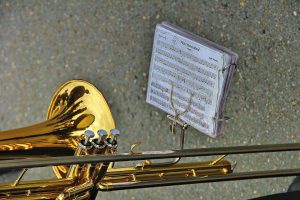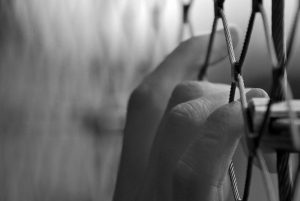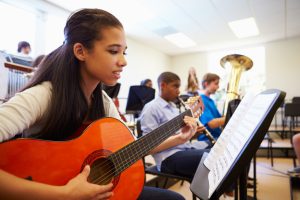Some kids get to live their dreams. Some, well, they fall through the cracks. Some have access to programs that challenge them and bring out the best in them, while some look around and see nothing but low expectations and indifference, or worse. Dr. Chad Bernstein, founder of Guitars Over Guns, may have been one of the lucky ones, but, for the last 12 years, he has been using that privilege to lift up at-risk youth in Miami and Chicago.
Guitars Over Guns, which Bernstein founded in 2008, offers kids in vulnerable communities a chance to participate in a music education and mentorship program that aims “to help them overcome hardship, find their voice and reach their potential as tomorrow’s leaders.” His organization, which has professional musicians both lead music classes with at-risk youth, as well as provide a one-on-one mentoring relationship, has been wildly successful. They are proving that the secret to engaging with the kids that seem the hardest to reach may not be such a secret after all: as Bernstein says, you just have to “keep showing up.”

“A Refuge and a Voice”
While he was growing up, Dr. Chad Bernstein, like many kids, found a safe space in the arts. He suffered the normal childhood slings and arrows, dealing with bullies, self-esteem issues, and disengagement at school. When he discovered the school band and the trombone, though, his world changed. Playing in the band gave him a place to be himself, and to find an enjoyment in going to school that he hadn’t found before. “Music has always been my identity, even when there didn’t feel like there was anything else in the mirror that I could hold onto,” Bernstein said. “It gave me refuge and a voice.”
For Bernstein, his access to an engaging school music program led him down a path full of opportunities to do what he most wanted to do. He attended the college of his dreams, The University of Miami Frost School of Music, where he also went on to receive his master’s degree and doctorate. He has been able to tour the world and record with top musicians, as well as help create the sound of Miami with his two bands, Suenalo and the Spam Allstars. But it was one small favor for a friend that led him to what seems to be his true calling: changing the lives of young people through music.
“The Power of Music As an Escape”
In 2006, a friend asked Bernstein to speak and perform at a career day for young people in a juvenile detention facility. The visit got off to an unpromising start, and it seemed as if Bernstein was in for a depressing day. First, some of the instruments his band had brought along to play were taken away: “We couldn’t bring our guitars in, or anything with strings, because [they said] the kids might use them to strangle us,” remembered Bernstein.

Things didn’t seem to improve from there. When he got up to speak, the kids’ eyes glazed over. “They had zero interest in what we were saying…We were in a room with 40 kids convicted of God knows what. Nothing was landing, there was no connection,” he said. But then the band started playing. “Then they started listening,” said Bernstein,” They got into the moment. It was beautiful to see the power of music as an escape for whatever they were going through.”
Kids started nodding along, engaging in call-and-response, then chanting, then rapping. Something amazing happened: they made the song their own and everyone began jamming together. Bernstein felt that same excitement he had felt when he had first encountered the school band, and another amazing thing happened. Bernstein decided that he wanted to use music to reach the kids in his community who most needed to be reached.
“You Have to Prove It”
From that one favor for a friend, that started out so discouragingly, Guitars Over Guns was born. It began as an informal, volunteer-based program, with Bernstein and others mentoring young people and offering them music instruction. But when he saw the results, Bernstein decided to dedicate more of his time to it; he sought help from his father and turned Guitars Over Guns into a formalized nonprofit organization.
Bernstein, like many of us, was aware of the bleak prospects for kids who fall through the cracks. The kids he saw when he started volunteering had no one to connect to, and some were experiencing traumas way beyond their years. They were “working through trying situations — homelessness, attempts to be set on fire in their sleep by their parents, some who drive themselves to school because their parents are alcoholics,” he said.

The kids he began working with were in danger of dropping out of school, as approximately 1.2 million children do every year in the U.S. Not only are young people who dropout of school likely to earn almost $400,000 less than high school graduates, and approximately $1 million less than college graduates over their lifetimes, but they are far more likely to end up in very bad circumstances. According to recent studies, on any given day, 1 in 10 high school dropouts is in jail or juvenile detention. They are also more likely to live in poverty, give birth at a young age, and suffer from poor health.
But where others might see hopelessness, Bernstein saw an avenue for reaching at-risk kids before things became, well, more risky for them. He realized that “all” you have to do is be there for them, 100%, and show them that they’re worth your care. According to Bernstein, “Nothing you can say can build that trust and create that vulnerability to create a relationship. You have to prove it and it takes a long time,” he says. “Give your word that you’ll be back even though they might flip the bird and tell you to go fly a kite … in less nice words. When you come back it says more than you ever could have.”
So Guitars Over Guns kept coming back, matching students with mentors, all of whom are professional musicians, and getting the kids to engage in music lessons (with healthy doses of affection, fun, and discipline). With all of this hard work, Bernstein saw kids’ lives changing for the better. The numbers bear that out: of the more than 4,000 students the program has reached since 2008, 94% improved their GPAs and school attendance records, and 99% have been promoted to the next grade on time. In surveys, 91% of participating students say they’ve learned to better appreciate their own talents, 94% report improved decision-making skills and 98% report increased confidence and self-esteem.
“The Freedom to Choose a Path of Their Own”
The numbers above are not only promising, they’re astonishing. The success of Guitars Over Guns exposes the truth that, as they state on their website, “It’s not that [children in underserved communities] don’t hold the same promise as other students. And it’s not that they don’t have dreams of their own. It’s that, due to circumstances beyond their control, they don’t always know that they have the freedom to choose a path of their own.” Bernstein’s solution is clearly art. As he says:
[Art is] a reflection of a place where people see themselves represented and feel they’re the authors of that space, tell their story, share their culture and celebrate who they are freely. The arts are both the best representation of that and the embodiment of what that spirit and culture is. Music has always been a blank canvas for those to speak up, particularly if the table doesn’t have space for them. People are able to unload, at least in moments, through music, and it’s one of the most sacred things we have. Sometimes those opportunities to escape and be immersed in it is what helps many of us get through the day.
And the kids Guitars Over Guns has reached? There are many who offer their very positive take on their experience with the program, including Junior Pierre, who was once in continual danger of failing out of school. After participating in Guitars Over Guns, his grades and engagement improved, and he eventually went on to not only graduate, but receive offers of scholarships to prestigious music schools. When speaking of Bernstein, he said: “Chad has seen something in me that I probably would have never seen. Guitars Over Guns has shaped my future desires and what I want to get accomplished.” 
The students who work with Guitars Over Guns see the same benefits to music that Bernstein sees, and it is so inspiring that this organization has given them the voice (and the refuge) to find that “space” and ability to “tell their story” within themselves. According to another program participant, Jakaree Whyms, “One thing that music does is help you understand what you can and what you can’t control. Because you can put stuff in lists and into bars and put those into music and you start to understand the bigger picture. What you couldn’t convey first, [you learn] because you were misguided with anger and all these emotions that you couldn’t understand.”
If you would like to help out, you can donate to Guitars Over Guns here; head to their website to find other ways to get involved with them.
